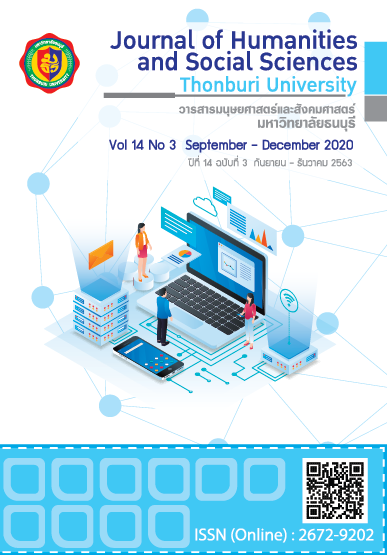Integrated Approach of Cooperative Education Management Develop Entrepreneurial Graduates
Keywords:
Integration, cooperative education standard, Thai Qualifications Framework for Higher Education, Entrepreneurial GraduateAbstract
Abstract
This research aimed to study were to examine the competencies of cooperative education students in the workplace according to the Thai Qualifications Framework for Higher Education (TQF) alongside with the entrepreneurial success to develop cooperative education students. The subjects were 283 executives, managers/heads of the departments, job supervisors, cooperative education advisors. The data were analyzed by using Multiple Regression Analysis. The results showed that 1) the competencies of cooperative education students in the workplace in relation to the five skill domains of Thai Qualifications Framework for Higher Education (TQF) and factors of the entrepreneurial success to develop cooperative education students were rated at a high level. 2) hypothesis testing result was analyzed on weight of impact of independent variable which affected, It showed the factors of the competencies of cooperative students are the analytical, communication and the use of information technology skills followed by intellectual skills, moral and ethics skills, knowledge skills, and interpersonal and responsibilities skills at the statistical significance level of 0.05.
Keywords: Integration, cooperative education standard, Thai Qualifications Framework for Higher Education, Entrepreneurial Graduate
References
เกรียงศักดิ์ เจริญวงศ์ศักดิ์. (2559). อนาคตใหม่ของการศึกษาไทยในยุค Thailand 4.0. สืบค้นเมื่อ 20 พฤศจิกายน 2562, จาก http://www.li.mahidol.ac.th/conference2016/thailand4.pdf.
จงจิตต์ ฤทธิรงค์; และ รีนา ต๊ะดี. (2558). ข้อท้าทายในการผลิตแรงงานฝีมือไทยเพื่อเข้าสู่ตลาดแรงงาน ประชาคมเศรษฐกิจอาเซียน. สืบค้นเมื่อ 1 ธันวาคม 2562, จาก http://www.ms.ipsr.mahidol.ac.th/ConferenceXI/article2558_ detail.php?article_id=25.
ปานเพชร ชินินทร; และ วิเชษฐ์ พลายมาศ. (2553). “การศึกษาปัจจัยความสำเร็จของการจัดการศึกษาเชิงบูรณาการกับการทำงานสำหรับอุดมศึกษาไทย (Work integrated Learning: Wil)”. สืบค้นเมื่อ 30 พฤศจิกายน 2562, จาก http://researchconference.kps.ku.ac.th/article_7/pdf/o_edu04.pdf.
พระราชบัญญัติมาตรฐานการอุดมศึกษา พ.ศ. 2562. (2561, 17 สิงหาคม). ราชกิจจานุกเบกษา. เล่มที่ 135 ตอนพิเศษ หน้า 19-21.
พระราชบัญญัติยุทธศาสตร์ชาติ พ.ศ. 2561–2580. (2561, 13 ตุลาคม). ราชกิจจานุกเบกษา. เล่มที่ 135 ตอนที่ 82ก หน้า 1-71.
สมาคมสหกิจศึกษาไทย. (2553). ประมวลสาระชุดฝึกอบรมสหกิจศึกษา เล่ม 2. กรุงเทพฯ: สมาคมสหกิจศึกษาไทย.
สายก้อน; และ ไพฑูรย์ อินต๊ะขัน. (2555). คุณลักษณะของบัณฑิตสาขาวิชาการบัญชีที่พึงประสงค์. วารสารมาลินีมหาวิทยาลัยราชภัฏลำปาง. 77-86.
สำนักงานคณะกรรมการการอุดมศึกษา. (2556). แผนการดำเนินการส่งเสริมสหกิจศึกษาในสถาบันอุดมศึกษา พ.ศ. 2556-2558. กรุงเทพฯ: พิมพ์รุ่ง.
สุรเกียรติ ธาดาวัฒนาวิทย์. (2561). คุณลักษณะบัณฑิตที่สอดคล้องกับการพัฒนาประเทศไทยตามแนว “ประเทศไทย 4.0” วารสารวิทยาลัยดุสิตธานี. 404-416.
Cronbach, Lee J. (1990). Essential of psychological Testing. 3rded. New York: Harper Row.
Finegold, D. and Notabartolo, A.S. (2010). 21st-century competencies and their impact: An Interdisciplinary literature review. The William and Flora Hewlett Foundation. Retrieved November 12, 2014, from http://www.hewlett.org/uploads/21st_Century_Competencies_Impact.pdf.
Kavanagh, M. and Drennan, L. (2008). What skills and attributes does an accounting graduate need? Evidence from student perceptions and employer expectations. Accounting & Finance. 279–300.
Likert, Rensis. (1967). A Technique for the measurement of Attitude. Chicago: Rand me Nally Company.
OECD. (2018). Preparing our youth for an inclusive and sustainable world. Paris: OECD.
World Economic Forum. (2016). The 10 Skills You Need to Thrive in the Fourth Industrial Revolution. Retrieved from: https://www.weforum.org/agenda/2016/01/the-10-skills-you-need-to-thrive-in-thefourth-industrial-revolution/
Yamane, T. (1973). Statistics: An Introductory Analysis. 3rded. New York: Harper and Row Publication.
Translated Thai References
Chareonwongsak, K. (2016). Thailand Education in Thailand 4.0. Retrieved from http://www.li.mahidol.ac.th/ conference2016/thailand4.pdf. (in Thai)
Chinintorn, P.;& Plaimart, W. (2010). Success of education integrated with the work of higher education for Thailand. Retrieved from http://researchconference.kps.ku.ac.th/article_7/pdf/o_edu04.pdf. (in Thai)
Higher Education Standards Act B. E. 2019, (2019, 17 August). Royal Gazette. Vol.135 Part 135special. 19-21. (in Thai)
Office of the Higher Education Commission. (2013). Action Plan for Cooperative Education in Higher Education Institutions 2013-2015. Bangkok: Thai rung. (in Thai)
Rittirong J. and Reena T. (2015). Challenges in Producing Thai Skilled Labor for AEC Job Market. Retrieved from http://www.ms.ipsr.mahidol.ac.th/ConferenceXI/article2558_detail.php?article_id=25. (in Thai)
Saikon, M. and Intakhan, P. (2012). Desirable Characteristics of Accounting Degree. Lampang Rajabhat University Journal. 77-86.
Tadawattanawit, S. (2018). The characteristics of the graduates in accordance with the development of Thailand according to the “Thailand 4.0” Economic Model. Dusit Thani College Journal. 12(2): 404-416. (in Thai)
Thai Association for Cooperative Education. (2012). Manual for Cooperative Education Provision, Bangkok. (in Thai)
The National Strategy Act B. E. 2017–2036, (2017, 13 October). Royal Gazette. 1-71. (in Thai)







